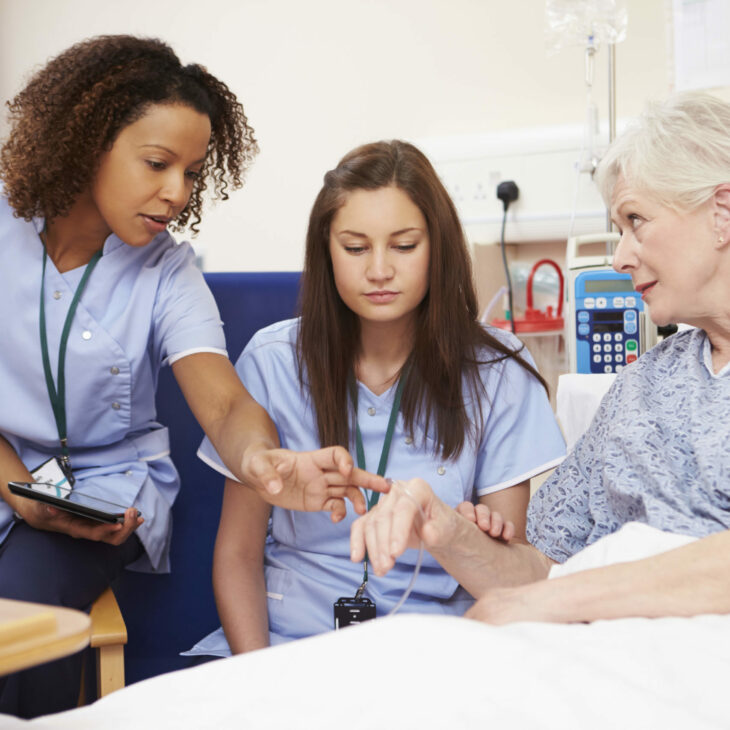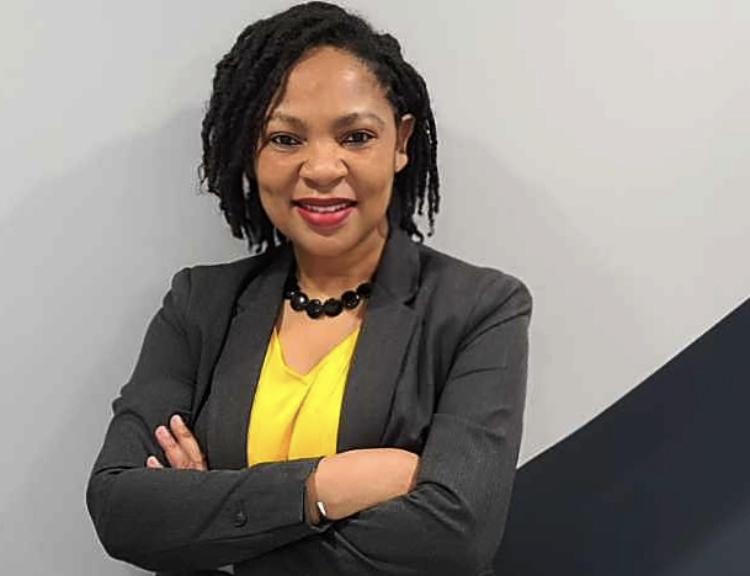Who Will Care for the Caregivers? A Conversation with Dr. Joset Brown
August 8, 2022

Dr. Joset Brown is a trauma nurse and educator at William Paterson University in Wayne, New Jersey. Interfaith America Magazine interviewed her about the impact of the COVID-19 pandemic, her commitment to providing spiritual care for nurses and teaching religious literacy to nursing students.
The conversation has been edited for length and clarity.
Interfaith America: Why is it important for nurses to have some religious literacy?
Dr. Joset Brown: I worked in the emergency room in Paterson, New Jersey, and a Catholic hospital in Teaneck, New Jersey. Then I went to work in academia. In the last four or five years, I’ve been at a public university in New Jersey as well. I integrated religious diversity and religious tolerance into our curriculum for nurses. At the time, I taught the first levels, the foundations of nursing for nursing students. And I found that they were very task oriented, so everything was about learning how to do the injection, learning how to do the dressing, that kind of thing. And as much as they learned culture as a course, they didn’t quite tie that into anything.
I had an assignment where they had to talk about the patient in their entirety: concepts, body systems, values, and there’s a section for religion. Almost always it is left blank, or they’ll just say “Catholic” or “Christian,” but that’s it, because nobody really talks about that. So I included that as part of the assignment that they had to really address it and really talk to patients more than just, “Are you Jehovah’s Witness?” That seems to be the common question.
So then, here comes COVID. I’m no longer on the frontline, but almost all my friends are nurses, so I am hearing it and feeling it from their perspective. The nurses themselves were okay; they had COVID, they recovered, they got better. A lot of them have long term effects. But we were losing doctors, we were losing housekeepers, transporters, nutrition, dietary people who just brought food. And then it took a turn where the nurses were losing their loved ones. I had, in the space of one night, that 24-hour period, two nurses who worked on the same unit lost their husbands. So it becomes that point where you are tired, you are physically tired, you’re emotionally tired, and there’s nobody to care for us. Because the caregivers really are providing the care and they’re going, going, going at their own expense. And it’s not just physical safety. It is an emotional standpoint as well, because we were just seeing people dying in high numbers. It took a toll on everybody.
We all know that most hospitals will have clergy for patients and possibly their families. The Catholic institutions, they do the last rites, for example. And if we have a sudden death, or something emotionally difficult, here comes the clergy. However, it wasn’t really for the staff. It was for the patients and their families. We didn’t have that kind of support.

IA: What questions do you encourage your students to ask to ask beyond “what is your religion”?
JB: That’s a question they don’t even ask. They’re really just learning the ropes of how to speak to someone, but also just to provide compassionate care and to be tolerant of somebody else’s perspective that’s different from yours. Because you will have somebody who is, say, Baptist, right? And they have to take care of a patient who’s Muslim, or a Buddhist, and they’re just like, “Here’s your pill” and they walk away. We might say to our students, if this person asks you for somewhere to pray, what would your discussion be? What would it look like? Or if this person says, “Yes, I know I’m anemic, but my religious belief bars me from taking blood transfusions,” do you just say, “Oh, okay,” and walk away? Or do you try to convince them that their religion is going to kill them? Because that’s the usual thing: “Oh, you won’t take the blood, okay. So you just will die then?”
Or will you say to the patient, “Okay, I understand that, but there are other options. Are you willing to entertain these other options?” Just to really understand that their belief is their belief, and their belief is such an integral part of how they seek care, and how they adhere to a plan of care for themselves. So it’s not simply noncompliance or because the patient doesn’t care about their illness; it’s a belief and it’s personal. So we talk about it from that perspective: How do we include someone’s religious preferences, respect it, be tolerant of it, but also weave that into the plan of care that we have?
IA: As far as spiritual care for nurses, what’s the path forward there?
JB: At this point, there is nothing that talks about spiritual care for nurses and/or nursing students. What we’ve been trying to do is to interweave it with self-care. You know, we talk a lot about self-care, but it’s discussed in terms of taking a rest, going for walks, feeding your body, drinking water, doing a manicure, doing something that makes you feel good. But also, what about your spiritual life? Your religious self-care? We kind of started talking about that around the time COVID began because a lot of people were getting anxious, were getting depressed, were questioning, “Why?” So we talked about that in class, we talked about the fact we had transition to virtual critical environments. Unfortunately, I see that it’s not being talked about again, because we’re out of the crisis, per se.
IA: What caused you to understand the importance of this topic, and what is your own faith connection?
I’m a spiritual person. I also am a religious person, but I do wax and wane sometimes as well. I am tolerant of other people’s beliefs, but also just to be making myself mindful, because there were so many things that I didn’t know. Through Interfaith America, we have a small working group that looks at case studies to be used in other institutions. And we are learning so much. My colleagues and I were like, “Oh, I didn’t know that!” When people mention diversity, they’re thinking race, and they’re thinking culture. But how many of them are also looking at it from a religious perspective? The collaborative nature of it is excellent. Because that’s what we want. We want to broaden what we have to discuss, how we incorporate these things into our care.
For example, a couple years ago, I was meeting a group of students and we’re on a floor of a hospital where patients needed critical care. And there was this African American woman who I think was a Pentecostal Christian. She was very ill, and she was not necessarily open to medicine. So, her doctors were having a really hard time, telling her, “Well, this is what you need.” And she’d say, “Well, my God is a healer.” Yes, he is, but … So they were getting kind of frustrated with her and her inability to commit to a treatment. So off we went into the room this morning to check her blood sugar or something, and her church sisters were there. And suddenly, they grabbed my nursing student. And they started with the praying and the intercession and the yelling and the screaming. My little Caucasian, non-religious student was wondering, “What exactly is happening?” I’ve had some experience with this, but even I was thinking, “What in the world?” It was interesting in that my student kept looking at me, and I kept saying, “Okay, let’s just see where this goes. This is a part of who she is, and this is what she believes.” They behaved as if the Lord Jesus was going to come down and heal her right there in front of us. It was quite an experience.
My student walked out of there, and she was in tears. She was like, “How did I get involved in this kind of thing? Is this a cult?” And I had to just tell her that, you know, it was how they worship, and it’s normal for them. And they didn’t take into consideration that she was not a part of it. I’m not saying that nursing students should know and be exposed to all of these different ways of worship and how people perceive their healers, but we should have some kind of understanding.
IA: Did the church sisters convince the patient to take some medicine? Or did she end up getting treatment?
JB: She ended up passing away. There was a disconnect to the family, where some people were angry at the doctors for not pushing the medicine. And what do you do? This came up in one of the case studies we were discussing, too: Who cares for us when we’re in that moral distress, where the patient isn’t adhering to what we recommend? So, even though I support you 100%, and I have no problems with dropping my clipboard and praying with you right there, I also believe in medicine.
So therein lies another quandary. It’s also religious practices when it comes to death and dying. That became an issue in COVID when the clergy wasn’t allowed in the room. How do we ensure safety for the clergy, and when somebody dies, how do you handle their body? Because there are some religions that say, turn it to the East, and nobody touches me, and everybody has to come in. As a nurse, it behooves me to go and read up on this, and a lot of us don’t.
I just want every caregiver to understand that it is important. You don’t need to know everything, but you need to know at least a little something.
Share
Related Articles
American Civic Life



